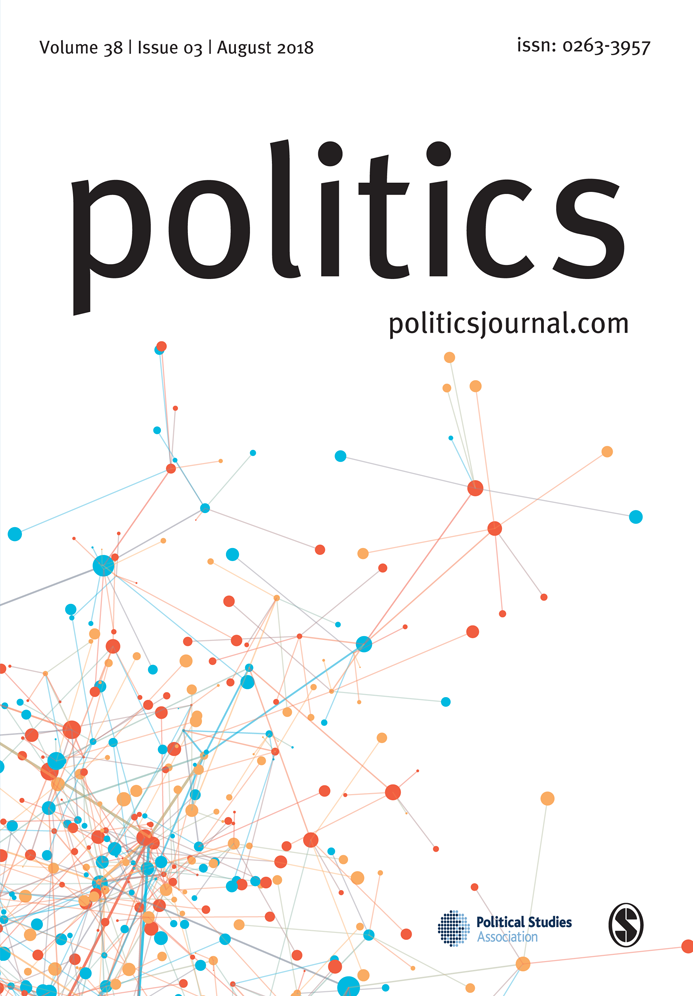.jpg&w=200&h=&zc=3)
Rudolf Metz’s new article entitled 'The missing link: Studying political leadership from the followers’ perspective' has been published in Politics.
Abstract
Recent political developments suggest that political followership has played increasingly vital roles in modern democratic politics. However, scholarship seemingly lacks proper conceptual and methodological tools for analysing why and how citizens follow their leaders, and what the role of this relationship is in personalised politics and political leadership. Addressing the research gap, this article turns to generic leadership studies for help and introduces its follower-centric models into the field of political science. This venture opens with a review and comparison of some of the different perspectives about political followers in the scholarship on political leadership and personalisation, taking account of their limitations. It then moves on to assess follower-centric models and their empirical results, focusing on observers’ perceptions about the characteristics and behaviours of leaders in the attribution of leadership. Based on these models, the article offers a balanced perspective about leader–follower relations. Recommendations for future research directions are presented in the concluding sections.
Rudolf Metz's blog post about the article from Politics blog:
 "Why do we follow our leaders?
"Why do we follow our leaders?
We, political scientists, don’t like to talk about it, but political followership lies at the heart of democratic politics: followers empower, support and control their leaders; the latter do everything to influence and manipulate followers’ preferences and decisions. No wonder why mainstream scholarship still avoids analysing the leader-follower relationship. The term ‘follower’ or ‘followership’ is usually associated with negative and passive connotations when compared to ideas like ‘voters’, ‘voting’, ‘citizens’, and ‘citizenship’, which prescribe active and democratic political participation. Despite our normative doubts, we should pay more attention to followers and their behaviours.
Unfortunately, political leadership studies haven’t focused properly on this problem yet. Scholars recognised that leadership is more complex than the over-romanticised myth of strong leaders accepting the dark side and collective, distributed forms of leadership. However, they are still determined strongly by the leader-centric view, minimalising followers’ role in the leadership process. In contrast, personalisation literature recognised the importance of relational dynamics but failed to provide a theoretically grounded explanation to it. Acknowledging this research gap, my recent paper in Politics develops a conceptual framework building on follower-centric models of generic leadership studies.
In the study, I define leadership as a social construct induced by followers’ cognitive-, attribution-, and identification processes. Followers’ beliefs about leaders’ traits, behaviour, and the consequences of leadership determine followers’ behaviour. We observe political events and actors and try to interpret their underlying sources of motivation and traits. If politicians meet our preconceived cognitive schemas, we consider them leaders and their activities as leadership. As a result, we follow them. These ideas determine not only our reactions but also our future expectations. The literature indicates two trajectories of attribution:
- Personalised relationships are dominated by the direct attribution of desirable qualities to a leader. The categorisation theory of leadership describes this process, examining individuals’ universal leadership prototypes or implicit leadership theories. Followers have general cognitive schemas about who they are likely to consider a good, effective or charismatic leader. If perceived reality exceeds, matches, or falls short of this imagination, they may accept someone’s offer to lead.
- Socialised relationships are derived from imaginary or real group membership. People cognitively represent social groups through prototypes that denote a mix of complex, obscure interrelated attributes that capture in-group similarities and intergroup differences. Politicians ought to represent their voters and embody group-specific leadership prototypes to be seen as leaders. This attribution process is detailed by the leadership’s social identity approach.
These attributed leadership prototypes generated different ideals (see general and country-specific perceptions about the position of head of government), but they are still closely related. Empirical results support that these attributional processes determine the selection of and support for leaders, acceptance of their influence, and evaluation of their performance.
The article argues these relations are far from static. Followers’ perceptions of leaders’ behaviour can easily change due to contextual factors (e.g. crises) or leaders’ actions. Regardless of the types of relations, researchers have highlighted that leaders seek to emphasise preferable traits to project to their voters. Moreover, the most successful politicians must become ‘identity entrepreneurs’ by shaping and manipulating the identities of their followers or deliberately using identity politics.
We should also be aware these processes are not free from distortions. According to James R. Meindl’s ‘romance of leadership’ thesis, people often attribute the causal mechanism to leadership in contrast to other contextual factors. This view of the chain of events can lead to the over-idealisation of leadership. This attributional error influences both attribution processes.
Overall the study provides a conceptual framework that allows us to analyse scientifically and understand political followership through a standardised methodological toolbox of generic leadership studies. It opens the way for further empirical analysis focusing on political leadership and personalisation."


